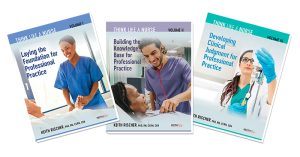
Why did you enter nursing? Did you want to serve and help others? Make a difference? Do you love health, wellness, and personal connections?
My guess is your WHY for nursing is also closely related to why you are passionate about nursing education.
It is no secret that the nursing workforce faces challenges, as is nursing education. But if we entered nursing and nursing education to serve others and make a difference, then I challenge each of us to promote SUCCESS in education and be attentive to the impact it can make on the future of nursing!
Use this acronym to make promoting SUCCESS practical in your program:
| S | Student-centered approach |
| U | Understand and appreciate each person’s unique strengths and talents |
| C | Connect with your student and your colleagues |
| C | Challenge your students and colleagues in a safe, uplifting manner |
| E | Empower your students and colleagues to do the right thing, to do better, and to lead change |
| S | Self-directed, independent, and confident behaviors will emerge in an environment that fosters their potential and supports them through challenges |
| S | Share and celebrate successes |
Now the difficult question… HOW?
S: Student-centered approach
Go back to the basics – Apply the nursing process concepts and patient education to your students and classroom.
In nursing, we recognize that we must provide individualized, holistic care to our patients. In the classroom this individualized, holistic care translates to providing a student-centered approach. Why would we ever consider doing anything different with our students?
U: Understand and appreciate each person’s unique strengths and talents
Look at each student like you would a patient and collaboratively create a plan for their learning, understanding, and utilizing their strengths and skills while providing resources to support them through anticipated and experienced challenges.
C: Connect with your student and your colleagues
Students will be more open and responsive to this approach when you connect with them in a meaningful way that demonstrates respect, empathy, inclusivity, and sincerity.
We have openly discussed our genuine desire to see our students succeed while balancing our professional and ethical responsibility to prepare them to care for others, being the difference between life and death at times.
This approach does not mean that expectations and standards are lowered; it means that we support students to rise to the challenge to become their absolute best.
When we proactively connect, demonstrate how to implement success strategies, collaborate with student services, and support students during their failures and successes, it will empower them to become more self-directed and confident in the classroom and clinical setting and their future as a professional nurses.
S: Share and celebrate successes
Sharing and celebrating their successes and your challenges and successes will model the characteristics that define our profession.
Next Step for Educators
Apply the Nursing Process and Patient Education concept to your classroom through:
- Assessment of learning preferences of your class as well as individual students
- Diagnose (or identify) strengths and challenges
- Plan collaboratively through the use of long-term and short-term SMART goals
- Implement an individualized learning plan, role-modeling the thinking and strategies known to promote success, and integrate appropriate student services
- Evaluate and revise the learning plan based on student feedback and outcomes.
Remember to meet your students where they are and create a pathway of success from their current position to their realistic goals. As educators, we can do this by introducing and practicing small, practical strategies with and alongside our students.
Students today come from a different learning environment than what we and where our past students came from; so, it makes sense that we may need to adjust our strategies. If we don’t see results in nursing care, we modify the intervention.
We have to do the same with our students.
In Closing
To promote student and program success, to elevate future patient outcomes, and lead the profession forward – we must be ready to be creative while practicing holistic care and empathy for our students (and our colleagues)!
In the end, graduates must still be able to practice holistic, safe, high-quality care with positive patient outcomes in an environment that continues to have higher acuity. Thus, our program expectations cannot be lowered.
How we help our students develop the strategies and characteristics to meet those expectations is up to us.
Student Success Resources/Links
- Self-assessments to learn more about themselves as a learner. Growth mindset: https://blog.futurefocusedlearning.net/growth-mindset-quiz
- Learning style assessment: https://vark-learn.com/the-vark-questionnaire/
- How to take notes: https://medium.goodnotes.com/the-best-note-taking-methods-for-college-students-451f412e264e
- Student Success BUNDLE: Download tools developed by Christi and Mindy to strengthen student success! https://keithrn.s3.us-east-amazonaws.com/Misc/Student+Success+Bundle.zip
This blog was written by:
- Christi Glesmann, EdD, MSN, RN, CNE, Director of Undergraduate Nursing/Associate Professor, College of Saint Mary, Omaha NE
- Questions? email Christi: CGlesmann@CSM.edu
- Mindy Barna, EdD, MSN, RN, Associate Dean of Health Professions / Associate Professor, College of Saint Mary, Omaha NE
I want to thank Christi and Mindy for their dedication and commitment to share their knowledge and passion on student success as co-authors of the chapters Student Life: Don’t Just Survive-Thrive! and Strategies for Optimum Academic Results in the upcoming student resource Laying the Foundation for Professional Practice.
Learn more:
- View Christi’s presentation on additional strategies for student success on Facebook Live 2/3/2022
New Resource Coming this Spring for Students!
 Students and new nurses need a holistic approach to develop clinical judgment and prepare them for safe practice. This comprehensive approach begins by emphasizing the 3 C’s: CARING, CRITICAL THINKING, and CLINICAL REASONING in 3 concise, complementary volumes:
Students and new nurses need a holistic approach to develop clinical judgment and prepare them for safe practice. This comprehensive approach begins by emphasizing the 3 C’s: CARING, CRITICAL THINKING, and CLINICAL REASONING in 3 concise, complementary volumes:
- Volume I: Laying the Foundation for Professional Practice
- Volume II: Building the Knowledge Base for Professional Practice
- Volume III: Developing Clinical Judgment for Professional Practice
Learn more and download a free excerpt from the first volume!
Learn more about the Student textbook series…
Keith Rischer – PhD, RN, CEN
As a nurse with over 35 years of experience who remained in practice as an educator, I’ve witnessed the gap between how nursing is taught and how it is practiced, and I decided to do something about it! Read more…
The Ultimate Solution to Develop Clinical Judgment Skills
KeithRN’s Think Like a Nurse Membership
Access exclusive active learning resources for faculty and students, including KeithRN Case Studies, making it your go-to resource.



